IT Ethics: iPhone Data Privacy, Ethical Theories, and Analysis
VerifiedAdded on 2021/06/17
|7
|1547
|71
Essay
AI Summary
This essay delves into the ethical dimensions of iPhone data privacy, examining the information the device collects and shares. It applies ethical frameworks, including utilitarianism, deontology, virtue theory, and contract theory, to analyze the implications of these practices. The essay explores the tension between user convenience and data security, evaluating the ethical considerations for both Apple and its users. The analysis includes a case study and provides recommendations for addressing the ethical challenges related to iPhone data privacy, such as enhancing user control over data sharing and promoting transparency in data collection practices. The paper emphasizes the need for a balanced approach that respects user privacy while leveraging the benefits of technology.
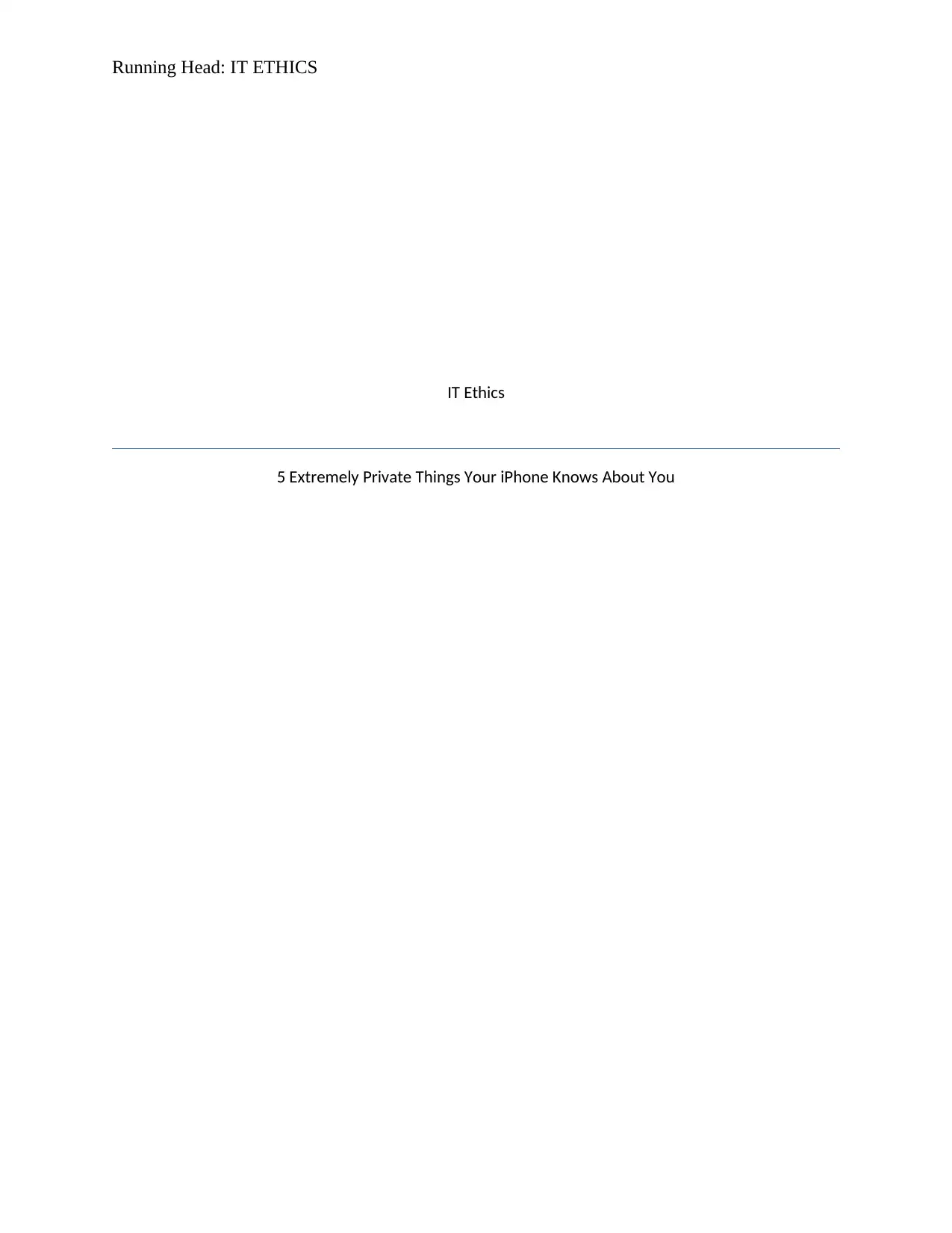
Running Head: IT ETHICS
IT Ethics
5 Extremely Private Things Your iPhone Knows About You
IT Ethics
5 Extremely Private Things Your iPhone Knows About You
Paraphrase This Document
Need a fresh take? Get an instant paraphrase of this document with our AI Paraphraser
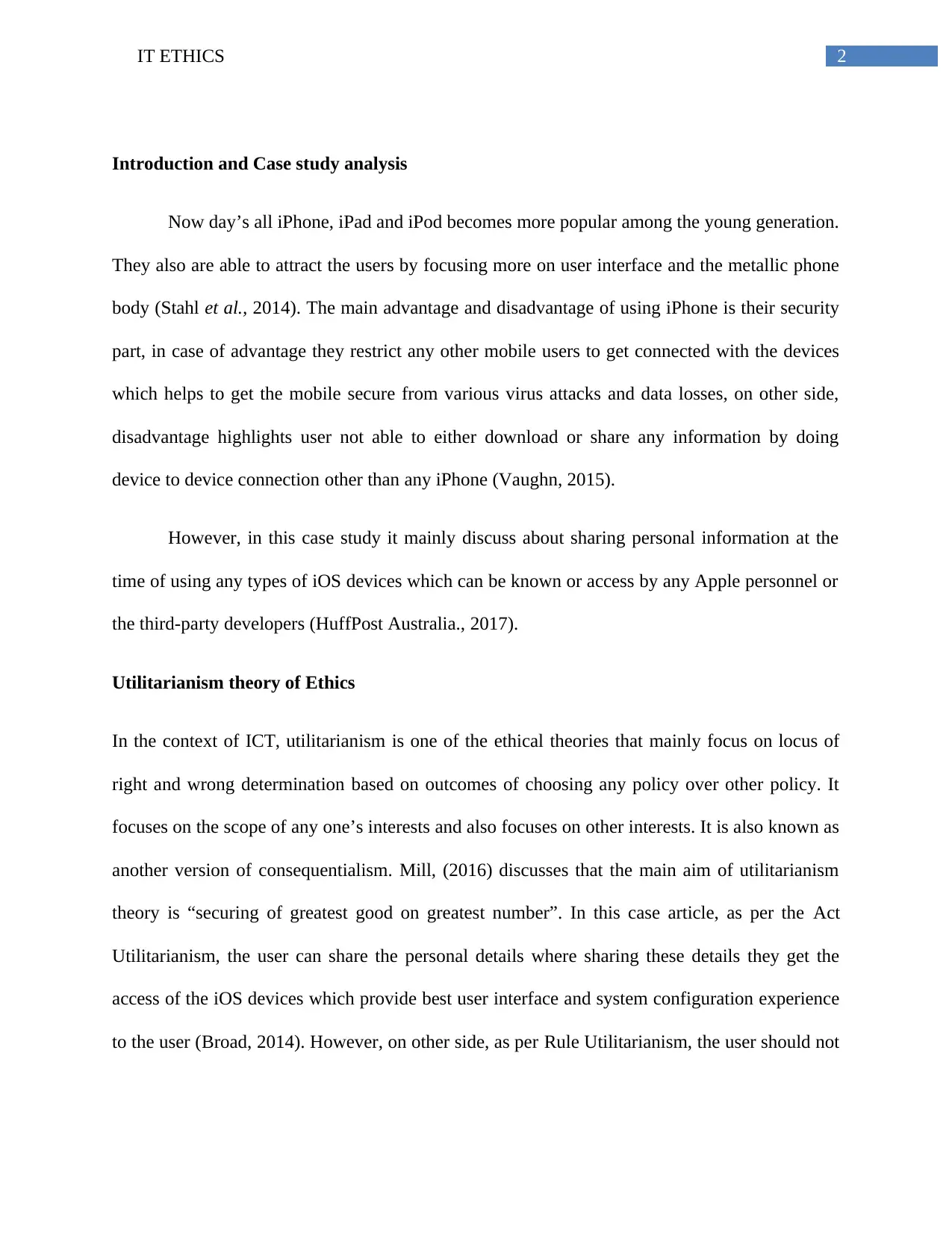
2IT ETHICS
Introduction and Case study analysis
Now day’s all iPhone, iPad and iPod becomes more popular among the young generation.
They also are able to attract the users by focusing more on user interface and the metallic phone
body (Stahl et al., 2014). The main advantage and disadvantage of using iPhone is their security
part, in case of advantage they restrict any other mobile users to get connected with the devices
which helps to get the mobile secure from various virus attacks and data losses, on other side,
disadvantage highlights user not able to either download or share any information by doing
device to device connection other than any iPhone (Vaughn, 2015).
However, in this case study it mainly discuss about sharing personal information at the
time of using any types of iOS devices which can be known or access by any Apple personnel or
the third-party developers (HuffPost Australia., 2017).
Utilitarianism theory of Ethics
In the context of ICT, utilitarianism is one of the ethical theories that mainly focus on locus of
right and wrong determination based on outcomes of choosing any policy over other policy. It
focuses on the scope of any one’s interests and also focuses on other interests. It is also known as
another version of consequentialism. Mill, (2016) discusses that the main aim of utilitarianism
theory is “securing of greatest good on greatest number”. In this case article, as per the Act
Utilitarianism, the user can share the personal details where sharing these details they get the
access of the iOS devices which provide best user interface and system configuration experience
to the user (Broad, 2014). However, on other side, as per Rule Utilitarianism, the user should not
Introduction and Case study analysis
Now day’s all iPhone, iPad and iPod becomes more popular among the young generation.
They also are able to attract the users by focusing more on user interface and the metallic phone
body (Stahl et al., 2014). The main advantage and disadvantage of using iPhone is their security
part, in case of advantage they restrict any other mobile users to get connected with the devices
which helps to get the mobile secure from various virus attacks and data losses, on other side,
disadvantage highlights user not able to either download or share any information by doing
device to device connection other than any iPhone (Vaughn, 2015).
However, in this case study it mainly discuss about sharing personal information at the
time of using any types of iOS devices which can be known or access by any Apple personnel or
the third-party developers (HuffPost Australia., 2017).
Utilitarianism theory of Ethics
In the context of ICT, utilitarianism is one of the ethical theories that mainly focus on locus of
right and wrong determination based on outcomes of choosing any policy over other policy. It
focuses on the scope of any one’s interests and also focuses on other interests. It is also known as
another version of consequentialism. Mill, (2016) discusses that the main aim of utilitarianism
theory is “securing of greatest good on greatest number”. In this case article, as per the Act
Utilitarianism, the user can share the personal details where sharing these details they get the
access of the iOS devices which provide best user interface and system configuration experience
to the user (Broad, 2014). However, on other side, as per Rule Utilitarianism, the user should not
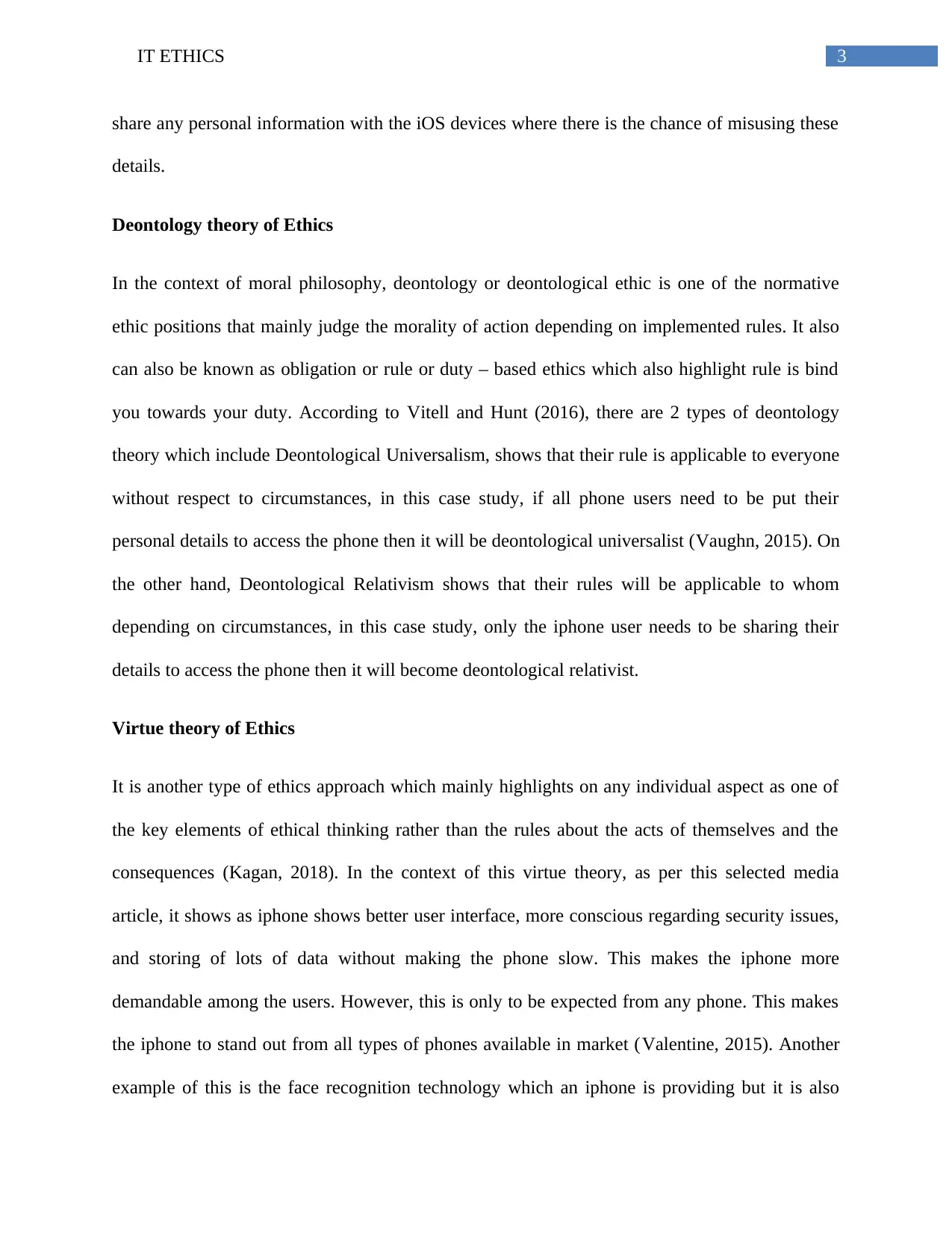
3IT ETHICS
share any personal information with the iOS devices where there is the chance of misusing these
details.
Deontology theory of Ethics
In the context of moral philosophy, deontology or deontological ethic is one of the normative
ethic positions that mainly judge the morality of action depending on implemented rules. It also
can also be known as obligation or rule or duty – based ethics which also highlight rule is bind
you towards your duty. According to Vitell and Hunt (2016), there are 2 types of deontology
theory which include Deontological Universalism, shows that their rule is applicable to everyone
without respect to circumstances, in this case study, if all phone users need to be put their
personal details to access the phone then it will be deontological universalist (Vaughn, 2015). On
the other hand, Deontological Relativism shows that their rules will be applicable to whom
depending on circumstances, in this case study, only the iphone user needs to be sharing their
details to access the phone then it will become deontological relativist.
Virtue theory of Ethics
It is another type of ethics approach which mainly highlights on any individual aspect as one of
the key elements of ethical thinking rather than the rules about the acts of themselves and the
consequences (Kagan, 2018). In the context of this virtue theory, as per this selected media
article, it shows as iphone shows better user interface, more conscious regarding security issues,
and storing of lots of data without making the phone slow. This makes the iphone more
demandable among the users. However, this is only to be expected from any phone. This makes
the iphone to stand out from all types of phones available in market (Valentine, 2015). Another
example of this is the face recognition technology which an iphone is providing but it is also
share any personal information with the iOS devices where there is the chance of misusing these
details.
Deontology theory of Ethics
In the context of moral philosophy, deontology or deontological ethic is one of the normative
ethic positions that mainly judge the morality of action depending on implemented rules. It also
can also be known as obligation or rule or duty – based ethics which also highlight rule is bind
you towards your duty. According to Vitell and Hunt (2016), there are 2 types of deontology
theory which include Deontological Universalism, shows that their rule is applicable to everyone
without respect to circumstances, in this case study, if all phone users need to be put their
personal details to access the phone then it will be deontological universalist (Vaughn, 2015). On
the other hand, Deontological Relativism shows that their rules will be applicable to whom
depending on circumstances, in this case study, only the iphone user needs to be sharing their
details to access the phone then it will become deontological relativist.
Virtue theory of Ethics
It is another type of ethics approach which mainly highlights on any individual aspect as one of
the key elements of ethical thinking rather than the rules about the acts of themselves and the
consequences (Kagan, 2018). In the context of this virtue theory, as per this selected media
article, it shows as iphone shows better user interface, more conscious regarding security issues,
and storing of lots of data without making the phone slow. This makes the iphone more
demandable among the users. However, this is only to be expected from any phone. This makes
the iphone to stand out from all types of phones available in market (Valentine, 2015). Another
example of this is the face recognition technology which an iphone is providing but it is also
⊘ This is a preview!⊘
Do you want full access?
Subscribe today to unlock all pages.

Trusted by 1+ million students worldwide
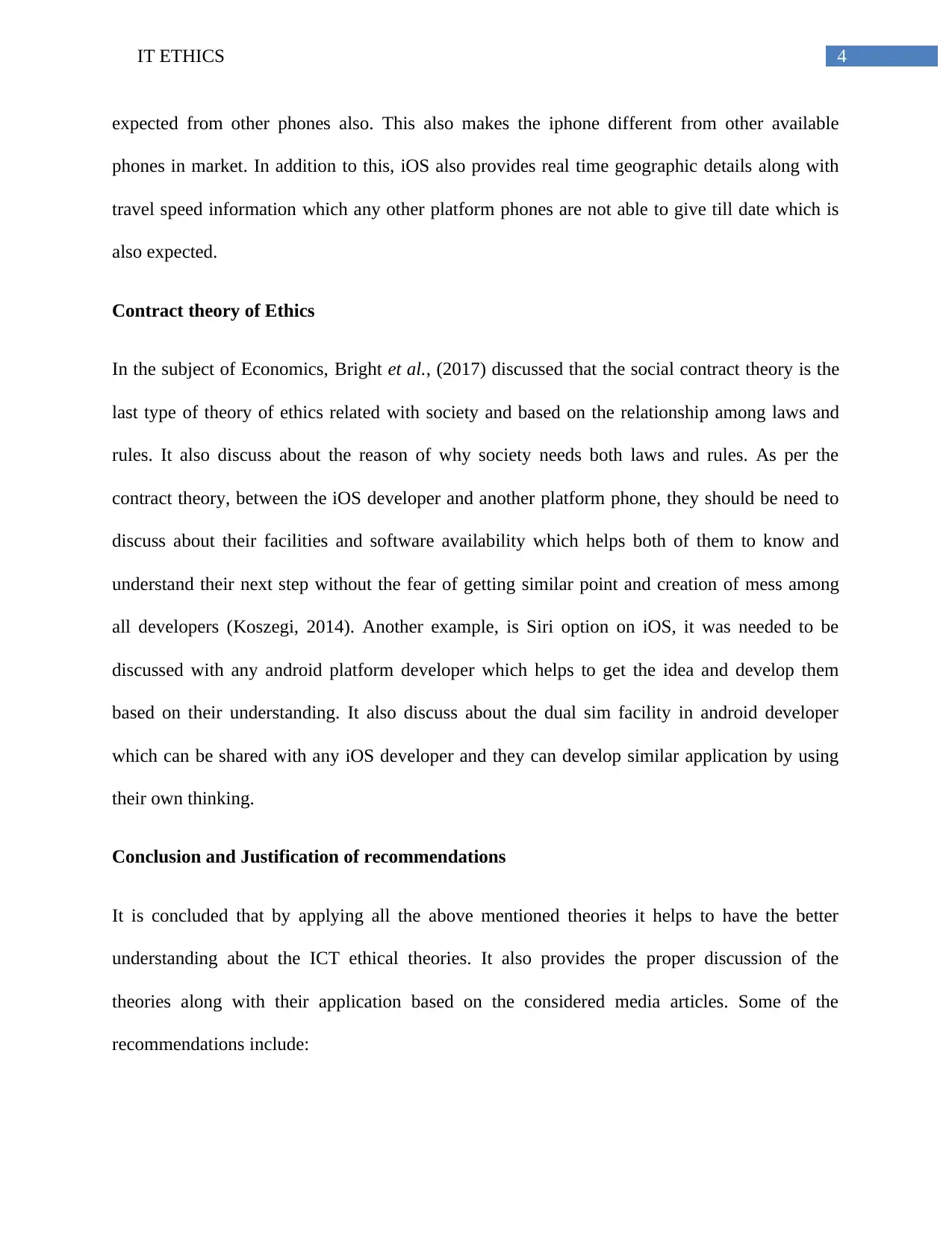
4IT ETHICS
expected from other phones also. This also makes the iphone different from other available
phones in market. In addition to this, iOS also provides real time geographic details along with
travel speed information which any other platform phones are not able to give till date which is
also expected.
Contract theory of Ethics
In the subject of Economics, Bright et al., (2017) discussed that the social contract theory is the
last type of theory of ethics related with society and based on the relationship among laws and
rules. It also discuss about the reason of why society needs both laws and rules. As per the
contract theory, between the iOS developer and another platform phone, they should be need to
discuss about their facilities and software availability which helps both of them to know and
understand their next step without the fear of getting similar point and creation of mess among
all developers (Koszegi, 2014). Another example, is Siri option on iOS, it was needed to be
discussed with any android platform developer which helps to get the idea and develop them
based on their understanding. It also discuss about the dual sim facility in android developer
which can be shared with any iOS developer and they can develop similar application by using
their own thinking.
Conclusion and Justification of recommendations
It is concluded that by applying all the above mentioned theories it helps to have the better
understanding about the ICT ethical theories. It also provides the proper discussion of the
theories along with their application based on the considered media articles. Some of the
recommendations include:
expected from other phones also. This also makes the iphone different from other available
phones in market. In addition to this, iOS also provides real time geographic details along with
travel speed information which any other platform phones are not able to give till date which is
also expected.
Contract theory of Ethics
In the subject of Economics, Bright et al., (2017) discussed that the social contract theory is the
last type of theory of ethics related with society and based on the relationship among laws and
rules. It also discuss about the reason of why society needs both laws and rules. As per the
contract theory, between the iOS developer and another platform phone, they should be need to
discuss about their facilities and software availability which helps both of them to know and
understand their next step without the fear of getting similar point and creation of mess among
all developers (Koszegi, 2014). Another example, is Siri option on iOS, it was needed to be
discussed with any android platform developer which helps to get the idea and develop them
based on their understanding. It also discuss about the dual sim facility in android developer
which can be shared with any iOS developer and they can develop similar application by using
their own thinking.
Conclusion and Justification of recommendations
It is concluded that by applying all the above mentioned theories it helps to have the better
understanding about the ICT ethical theories. It also provides the proper discussion of the
theories along with their application based on the considered media articles. Some of the
recommendations include:
Paraphrase This Document
Need a fresh take? Get an instant paraphrase of this document with our AI Paraphraser
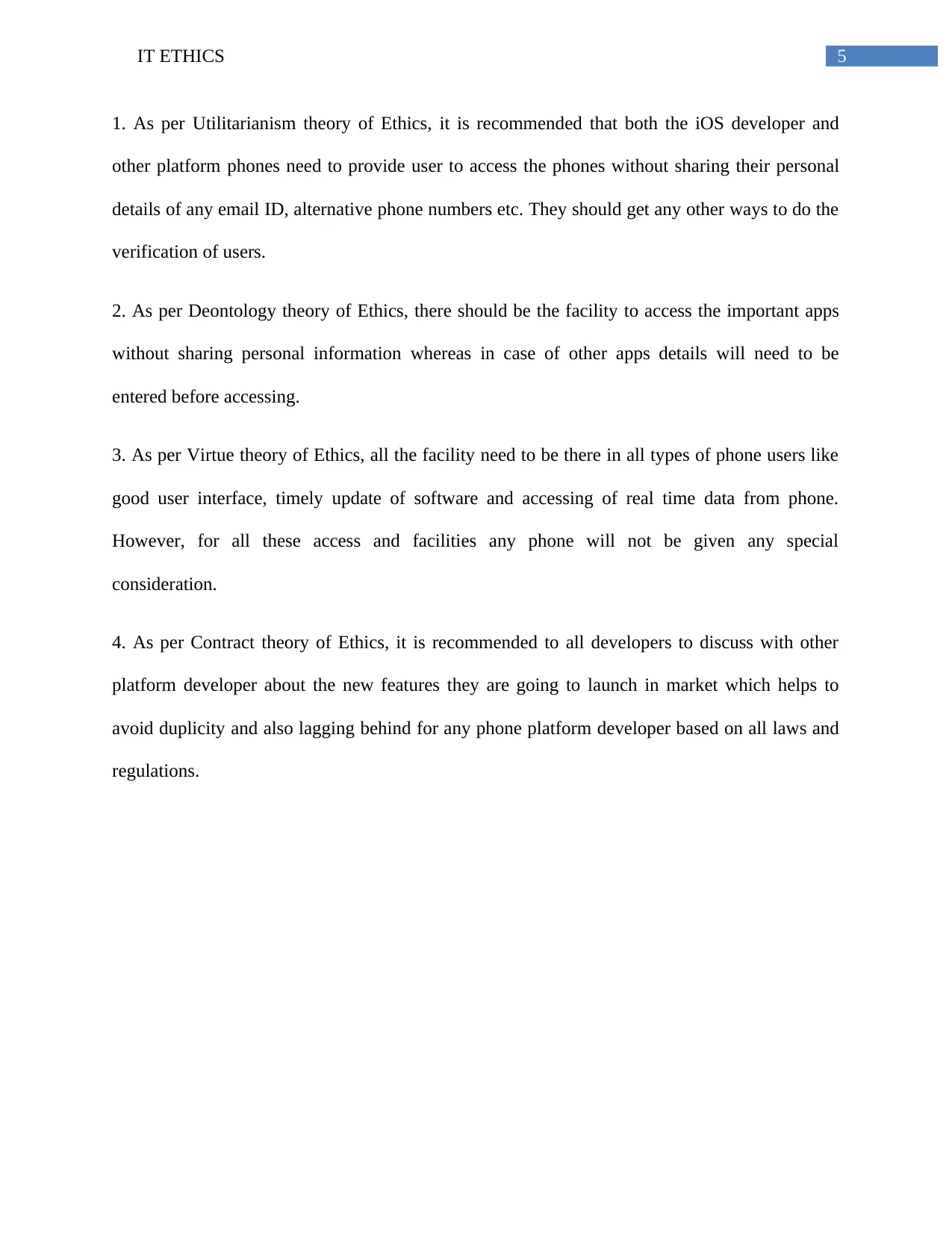
5IT ETHICS
1. As per Utilitarianism theory of Ethics, it is recommended that both the iOS developer and
other platform phones need to provide user to access the phones without sharing their personal
details of any email ID, alternative phone numbers etc. They should get any other ways to do the
verification of users.
2. As per Deontology theory of Ethics, there should be the facility to access the important apps
without sharing personal information whereas in case of other apps details will need to be
entered before accessing.
3. As per Virtue theory of Ethics, all the facility need to be there in all types of phone users like
good user interface, timely update of software and accessing of real time data from phone.
However, for all these access and facilities any phone will not be given any special
consideration.
4. As per Contract theory of Ethics, it is recommended to all developers to discuss with other
platform developer about the new features they are going to launch in market which helps to
avoid duplicity and also lagging behind for any phone platform developer based on all laws and
regulations.
1. As per Utilitarianism theory of Ethics, it is recommended that both the iOS developer and
other platform phones need to provide user to access the phones without sharing their personal
details of any email ID, alternative phone numbers etc. They should get any other ways to do the
verification of users.
2. As per Deontology theory of Ethics, there should be the facility to access the important apps
without sharing personal information whereas in case of other apps details will need to be
entered before accessing.
3. As per Virtue theory of Ethics, all the facility need to be there in all types of phone users like
good user interface, timely update of software and accessing of real time data from phone.
However, for all these access and facilities any phone will not be given any special
consideration.
4. As per Contract theory of Ethics, it is recommended to all developers to discuss with other
platform developer about the new features they are going to launch in market which helps to
avoid duplicity and also lagging behind for any phone platform developer based on all laws and
regulations.
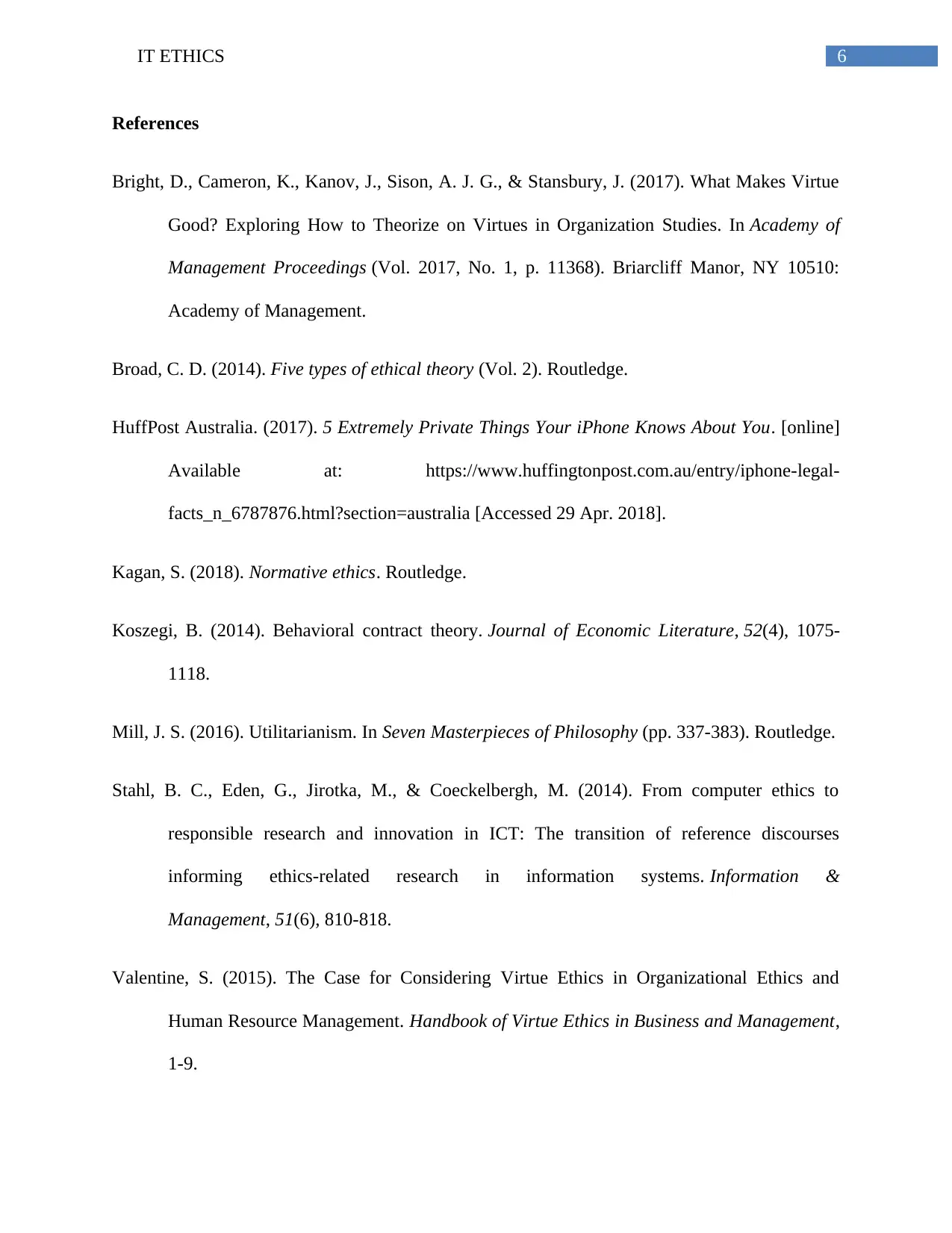
6IT ETHICS
References
Bright, D., Cameron, K., Kanov, J., Sison, A. J. G., & Stansbury, J. (2017). What Makes Virtue
Good? Exploring How to Theorize on Virtues in Organization Studies. In Academy of
Management Proceedings (Vol. 2017, No. 1, p. 11368). Briarcliff Manor, NY 10510:
Academy of Management.
Broad, C. D. (2014). Five types of ethical theory (Vol. 2). Routledge.
HuffPost Australia. (2017). 5 Extremely Private Things Your iPhone Knows About You. [online]
Available at: https://www.huffingtonpost.com.au/entry/iphone-legal-
facts_n_6787876.html?section=australia [Accessed 29 Apr. 2018].
Kagan, S. (2018). Normative ethics. Routledge.
Koszegi, B. (2014). Behavioral contract theory. Journal of Economic Literature, 52(4), 1075-
1118.
Mill, J. S. (2016). Utilitarianism. In Seven Masterpieces of Philosophy (pp. 337-383). Routledge.
Stahl, B. C., Eden, G., Jirotka, M., & Coeckelbergh, M. (2014). From computer ethics to
responsible research and innovation in ICT: The transition of reference discourses
informing ethics-related research in information systems. Information &
Management, 51(6), 810-818.
Valentine, S. (2015). The Case for Considering Virtue Ethics in Organizational Ethics and
Human Resource Management. Handbook of Virtue Ethics in Business and Management,
1-9.
References
Bright, D., Cameron, K., Kanov, J., Sison, A. J. G., & Stansbury, J. (2017). What Makes Virtue
Good? Exploring How to Theorize on Virtues in Organization Studies. In Academy of
Management Proceedings (Vol. 2017, No. 1, p. 11368). Briarcliff Manor, NY 10510:
Academy of Management.
Broad, C. D. (2014). Five types of ethical theory (Vol. 2). Routledge.
HuffPost Australia. (2017). 5 Extremely Private Things Your iPhone Knows About You. [online]
Available at: https://www.huffingtonpost.com.au/entry/iphone-legal-
facts_n_6787876.html?section=australia [Accessed 29 Apr. 2018].
Kagan, S. (2018). Normative ethics. Routledge.
Koszegi, B. (2014). Behavioral contract theory. Journal of Economic Literature, 52(4), 1075-
1118.
Mill, J. S. (2016). Utilitarianism. In Seven Masterpieces of Philosophy (pp. 337-383). Routledge.
Stahl, B. C., Eden, G., Jirotka, M., & Coeckelbergh, M. (2014). From computer ethics to
responsible research and innovation in ICT: The transition of reference discourses
informing ethics-related research in information systems. Information &
Management, 51(6), 810-818.
Valentine, S. (2015). The Case for Considering Virtue Ethics in Organizational Ethics and
Human Resource Management. Handbook of Virtue Ethics in Business and Management,
1-9.
⊘ This is a preview!⊘
Do you want full access?
Subscribe today to unlock all pages.

Trusted by 1+ million students worldwide
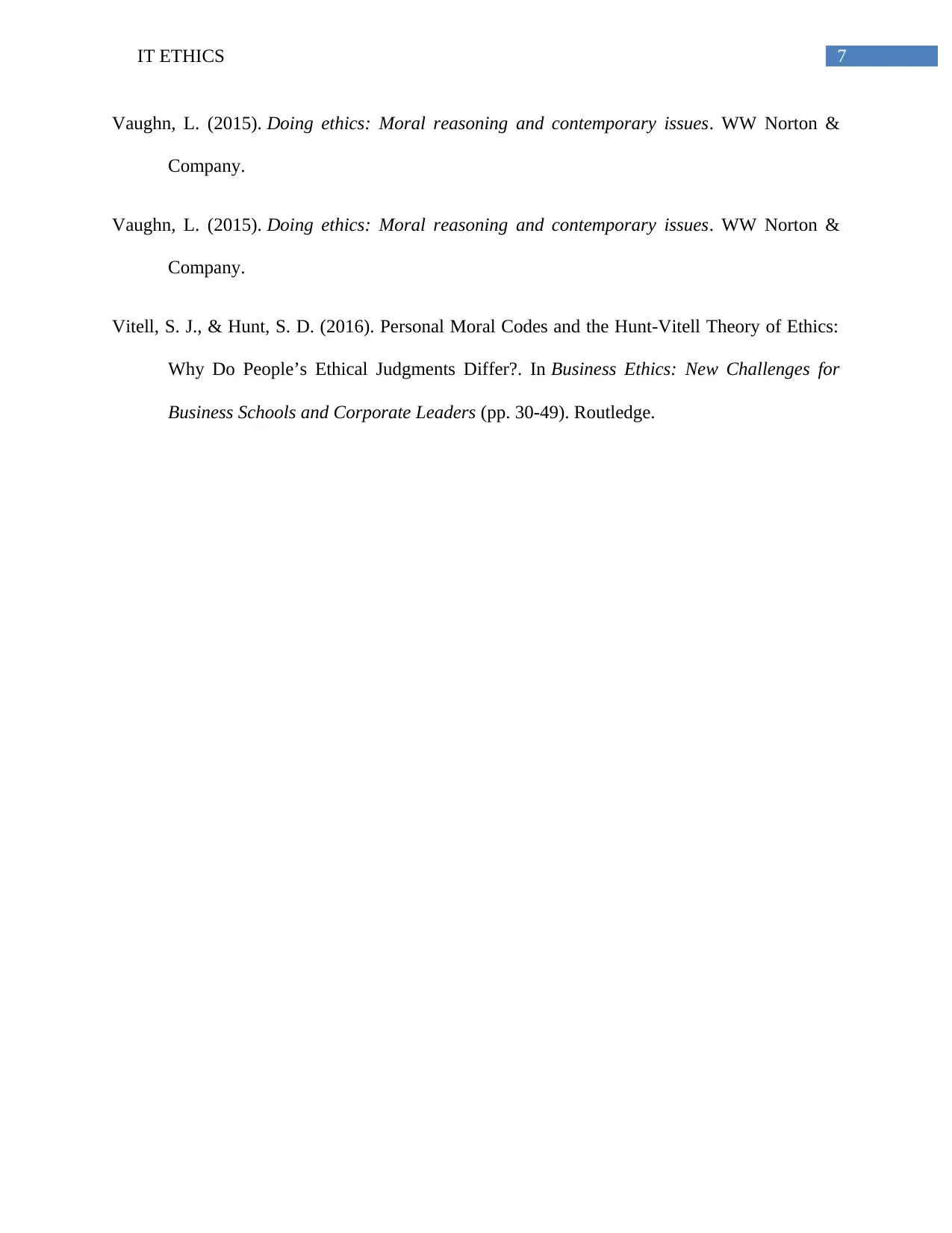
7IT ETHICS
Vaughn, L. (2015). Doing ethics: Moral reasoning and contemporary issues. WW Norton &
Company.
Vaughn, L. (2015). Doing ethics: Moral reasoning and contemporary issues. WW Norton &
Company.
Vitell, S. J., & Hunt, S. D. (2016). Personal Moral Codes and the Hunt-Vitell Theory of Ethics:
Why Do People’s Ethical Judgments Differ?. In Business Ethics: New Challenges for
Business Schools and Corporate Leaders (pp. 30-49). Routledge.
Vaughn, L. (2015). Doing ethics: Moral reasoning and contemporary issues. WW Norton &
Company.
Vaughn, L. (2015). Doing ethics: Moral reasoning and contemporary issues. WW Norton &
Company.
Vitell, S. J., & Hunt, S. D. (2016). Personal Moral Codes and the Hunt-Vitell Theory of Ethics:
Why Do People’s Ethical Judgments Differ?. In Business Ethics: New Challenges for
Business Schools and Corporate Leaders (pp. 30-49). Routledge.
1 out of 7
Related Documents
Your All-in-One AI-Powered Toolkit for Academic Success.
+13062052269
info@desklib.com
Available 24*7 on WhatsApp / Email
![[object Object]](/_next/static/media/star-bottom.7253800d.svg)
Unlock your academic potential
Copyright © 2020–2026 A2Z Services. All Rights Reserved. Developed and managed by ZUCOL.





